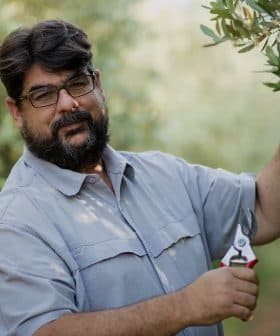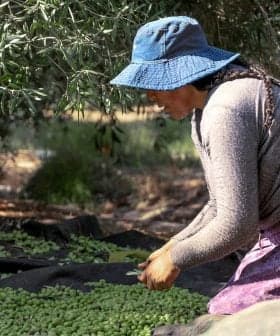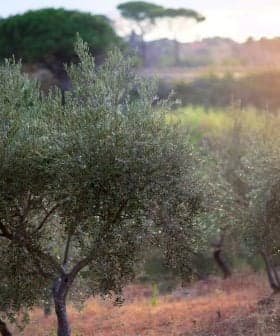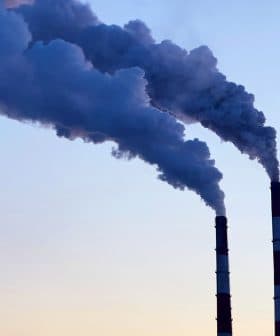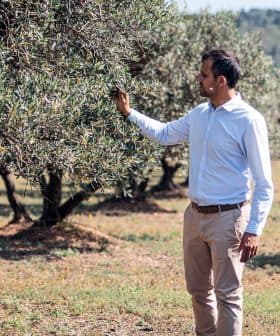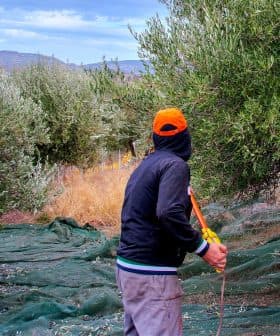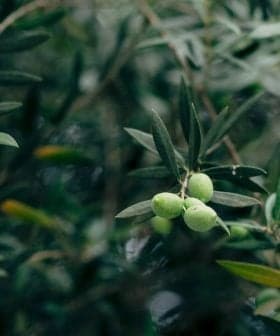California Producers Keep Olives and Workers Safe in Record Heat
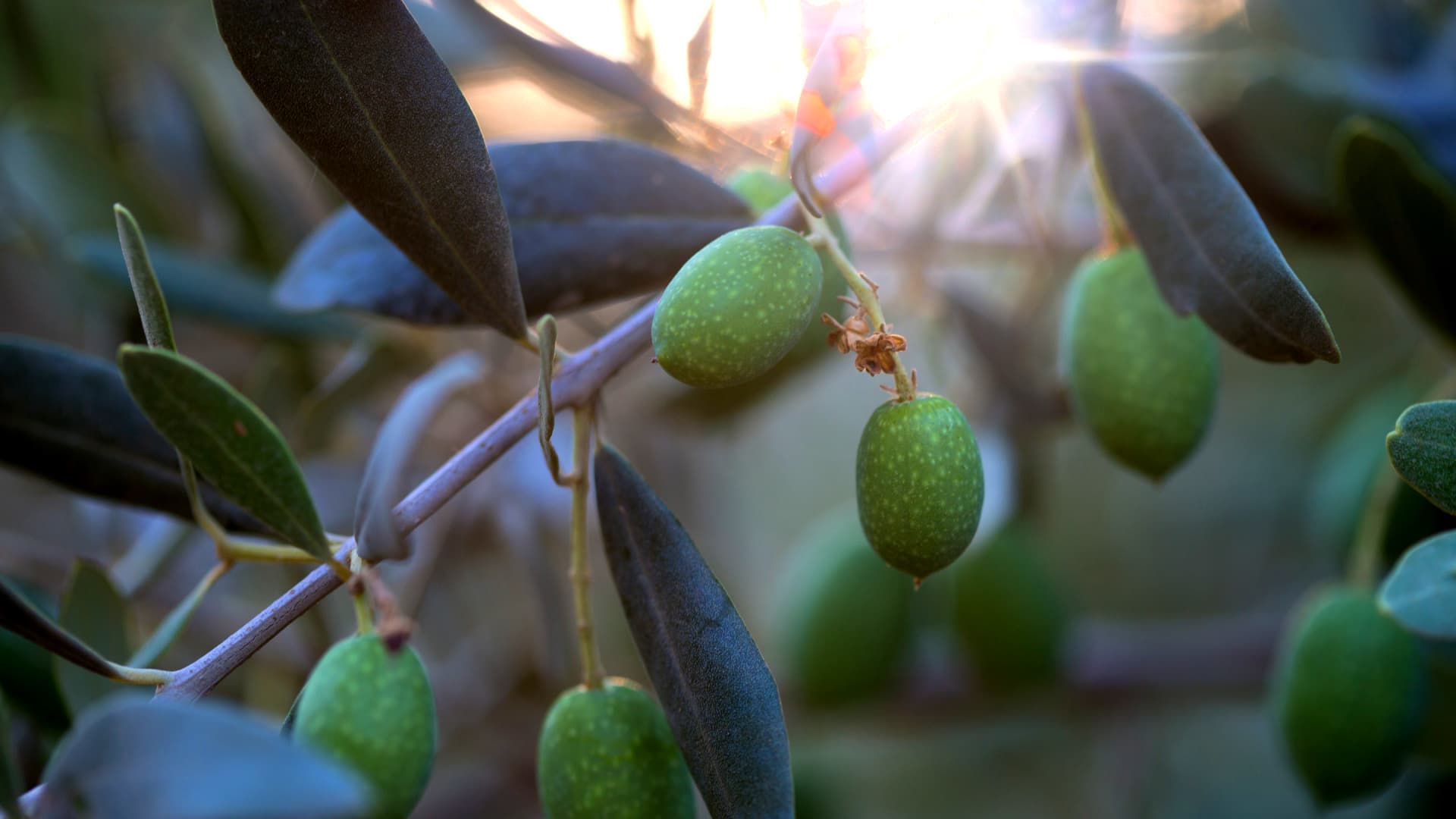
California is experiencing a severe heat wave, with temperatures reaching record highs in the Sacramento Valley and Northern California. Olive producers are taking strategic measures to protect their trees and fruit from the extreme heat, while also ensuring the safety and well-being of their workers in high-heat conditions.
Excessive heat warnings are dominating the news in California. According to the San Luis Obispo Tribune, the heat wave hit the prominent olive-growing county, with temperatures reaching 110 ºF (43.3 ºC).
CBS News reported record-high temperatures were in the triple digits for much of the Sacramento Valley and across Northern California. The nearly century-old (1935) record of 108 ºF (42.2 ºC) was topped in Sacramento, with a high of 109 ºF (42.8 ºC) on July 16.
(Harvest) results will always be influenced to some extent by climatic conditions, but with proper management, it is possible to mitigate potential impacts on yields and quality.
Cooling centers are open around the state to assist with prevention and recovery from heat-related illnesses.
With groves throughout the Sacramento Valley, Jim Lipman, the chief operating officer of California Olive Ranch, the largest producer in the United States, told Olive Oil Times: “We are not having an issue with the heat. We monitor our trees very closely and have been diligent in making sure the trees are properly irrigated.”
See Also:Sustainable Farming is Key to Quality as California Becomes Hotter and Drier“Our main priority is to protect the trees and their fruit to ensure they don’t undergo undue stress,” he added. “The extreme heat at this time of the phenological cycle is not a major risk to the tree. At high temperatures, the tree shuts down and stops pushing growth to the olive, ultimately inhibiting the accumulation of fat and forcing the tree to abort its fruit.”
Meanwhile, in his groves in Madera, about 220 kilometers south of Sacramento, Vincent Ricchiuti, the founder of Enzo Olive Oil Company, reached a similar conclusion.
“The olive trees and olives are holding strong,” he told Olive Oil Times. “We have invested in a lot of water technology to help us better understand what our crop needs are in real-time. Our irrigation schedules definitely increased in the past few weeks to counter-balance the heat wave.”
Back in the Sacramento Valley, Leandro Ravetti, the chief olive oil maker and co-chief executive of Cobram Estate Olives, said olives are naturally resilient plants and following strategic measures could mitigate the impacts of high heart.
“The olive tree is a very resilient and drought-tolerant plant,” Ravetti told Olive Oil Times. “It has mechanisms to handle heat waves quite well in comparison with other horticultural crops.”
“Over the past 20 years, Cobram Estate Olives and its Olive.iQ growing system have worked together to take appropriate strategic measures to prepare for potential effects of climate change at a regional level of our groves,” he added.
Ravetti described examples of strategic actions and practices. “Adoption of medium to high planting densities leads to a higher degree and more consistent levels of production,” he said. “Use of a wide range of varieties enables us to maximize current and future flexibility needed to incorporate genetics better adapted to new climatic conditions.”
“Implementation of our Olive.iQ climatic analysis assists us in determining optimal growing areas and or identifying potential environmental risks to put in place mitigation practices when possible,” he added.
Strategic measures, Ravetti said, include a variety of actions and practices, such as the adoption of pressurized low-volume irrigation systems to improve water application efficiency.
“The irrigation system is designed according to a comprehensive and exhaustive soil mapping determining suitable areas for development and most appropriate valve design and shift arrangements,” he said.
“Adoption of state-of-the-art irrigation scheduling and soil and tree monitoring help to better evaluate the response system to the amount of water applied through irrigation,” Ravetti added.
He also detailed the importance of adopting “permanent crop conservation management for the inter rows with a strict policy of no-tillage.”
Efforts to protect olive trees are in tandem with strategic steps to protect staff and farm workers. A report from Valley Public Radio said that as California’s heat wave intensifies, farmworkers in some regions are bearing the brunt. State officials say they are sending more agents out to help protect workers by enforcing the state’s heat regulations.
The report noted that early signs of heat stroke can include nausea, dizziness and headaches. California law requires employers to provide breaks for workers, shade and drinking water. The report confirmed that across California, state officials have fined more than 500 employers for violating heat regulations this year.
In contrast, officials at California Olive Ranch, Enzo and Cobram Estate said working conditions are a top priority. The employers added that they work diligently to protect workers in high-heat conditions.
Lipman explained that California Olive Ranch has procedures in place to take care of team member safety.
“Our focus, first and foremost, is the safety of our team members, especially during this heat wave,” he said. “When we have high temperatures, we adjust the team’s schedules so they are active during the cooler hours.”
“That could mean working nights instead of days or shifting their start times to earlier in the day,” Lipman added. “All workers have access to shade and water when they are in the field. Hydration is so important.”
Ricchiuti echoed that the safety of Enzo team members and farm workers is a top priority, especially in extreme heat. “We take great care of the well-being of team members and make sure everyone enjoys a safe working environment,” he said.
“When the heat rises, we shift our schedule to an earlier start so we are not out in the elements during peak temperatures,” Ricchiuti added. “We also will do certain farm activities like spraying overnight when the temperatures are much cooler for our team members.”
Ravetti concurred: “Cobram Estate uses a high degree of automation and mechanization in our farms,” he said. “This enables us to adopt a flexible approach regarding working hours and times of day when certain practices need to occur.”
“This flexibility, in turn, helps us provide the best possible working environment for our staff when extreme climatic conditions occur,” Ravetti added.
According to CBS News, high temperatures are expected to drop back into the 90s (32 ºC to 37 ºC), although triple digits may return to the region. With this extreme heat as a backdrop, producers weighed in on what is needed for success in the upcoming harvest.
Lipman identified irrigation as the vital component for a successful harvest. ”Irrigation is the most important variable we are controlling today. Irrigation is critical to allow the fruit to size and to drive fat accumulation,” he said. “We are also performing some canopy management activities to allow for efficient fruit removal with the harvesters.”
Optimism is the message from Ricchiuti. “We are looking forward to a successful harvest this season,” he said. “We have invested in some amazing technology to understand better how the trees are being impacted so we can make the needed farm adjustments in real-time.”
“The olive tree is well equipped to deal with high temperatures providing relevant cultural practices such as pruning, fertilization and, fundamentally irrigation, are well executed,” Ravetti added. “Continuing to apply best horticultural practices over the coming months will be important to ensure normal development of the fruit and its oil accumulation.”
“Results will always be influenced to some extent by climatic conditions, but with proper management, it is possible to mitigate potential impacts on yields and quality,” he concluded.


